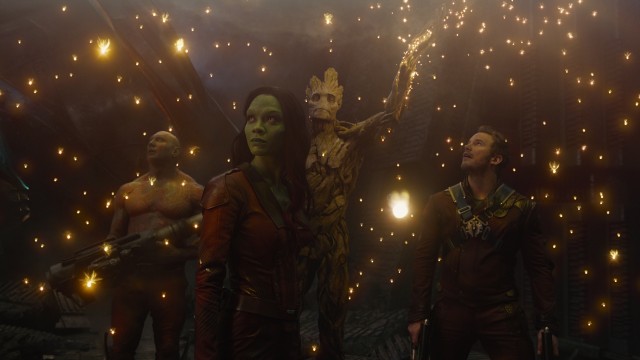I’m going to come clean; I’m not a big fan of the Marvel Cinematic Universe in the first place. I think it’s just fine if you’re a fan of goofy spectacle driven films. For the most part, the movies just seem to exist as a distraction, all with a similar corporate shiny style. Which is fine if you like that sort of spit-polish, turn-your-brain-off, tensionless, popcorn action spectacle that feels like all these other action spectacles. Before Guardians of the Galaxy, I think I saw Iron Man and The Avengers, and both of them felt like X-Men
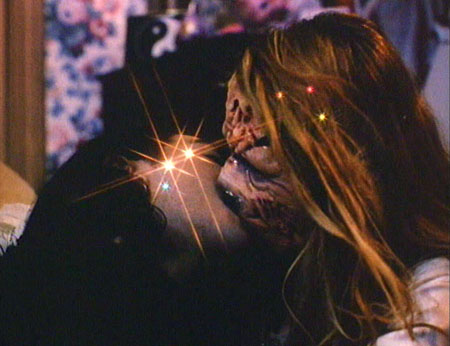
But, I love James Gunn. LOVE. Tromeo and Juliet was a great gleeful perversion. Scooby-Doo, and Dawn of the Dead were brilliant, incisive, movies that played with expectations (even if they didn’t subvert them). Slither is one of the great horror comedies of the ’00s. PG Porn is delightfully silly. Even Super had a lot of brilliance in it.
So, when James Gunn got the Guardians of the Galaxy gig, I was like, “OK, maybe this will be as watchable as The Avengers.” The reviews came out saying it was a clever subversion of the genre, and I thought, “OK, so this is James Gunn doing a Marvel movie.” Basically, I went in expecting a James Gunn movie using Marvel characters.
As I wrote to my friend, after seeing it, “That was a terrible James Gunn movie, but a mildly clever Marvel movie.” He responded that, “If you go into a Marvel movie expecting anything but a Marvel movie, you’re going to have a terrible time.” Which is total and utter truth.
The Plot isn’t as complete as it seems
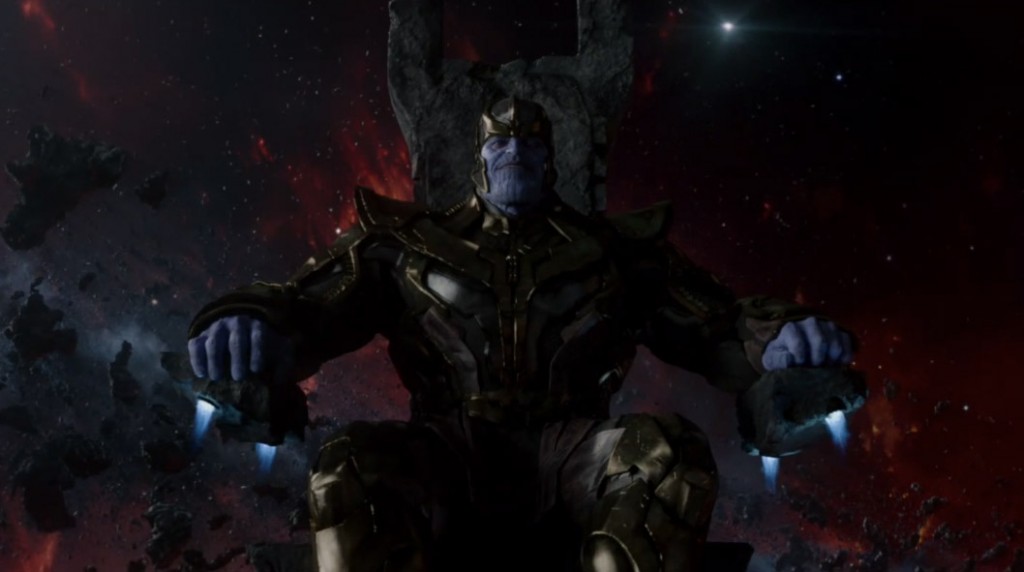
Having seen The Avengers once, I thought it was a really well-done self-contained movie that brought together a lot of disparate characters. It introduced them all rather nicely, and gave them mini story-arcs that were finished by the end of the movie. The bad guy of The Avengers seemed to be his own bad guy, and his defeat seemed to be the end of that incident. I quite liked it, it felt filling, and I didn’t need another Marvel movie until The Avengers 2.
Unlike The Avengers, Guardians of the Galaxy isn’t self-contained. Guardians of the Galaxy is more like Marvel Cinematic Universe: Guardians of the Galaxy – Part 1 than a complete individual movie. It failed in many of the ways that The Avengers succeeded as a stand-alone movie. I have a severe problem with this, as I don’t want to watch all 20+ episodes of the Marvel Cinematic Universe, plus watch Agents of SHIELD, plus read the Marvel comics in order to get the full story. When they announced that Guardians would be getting a sequel just before the movie came out, I had believed that Marvel had faith in the movie’s success, not that Guardians was only a first part movie.
The movie opens with Star-Lord listening to his mix-tape (more on that later) as his mother dies (comic book trope), and she tells him that his father was a being of light. He feels a bit remiss that he never held his mother’s hand. According to Guardians of the Galaxy, that’s his big childhood tragedy. Not that he never knew his father, or is even curious who his father was. But, that he didn’t connect with his mother on her death bed.
Star-Lord is next seen gleefully wandering through some ruins in a Raiders/Tomb Raider-rip off to steal some ball. The ball, it turns out, holds an Infinity Element, which is being coveted by everybody in the movie – Some second-hand shop dude wants it, The Collector wants it, Thanos wants it, Ronan wants it, Yandu wants it. It’s a powerful element, whose power is convolutedly explained in the movie. This explanation also includes the fact that there are more like it, and a supreme ruler will probably want to collect them all. The infinity elements are sort of like Mighty Morphin’ Power Rangers, they’re great on their own but together they build up to something fabulous.
Anyways, Star-Lord ends up connecting with a ragtag bunch of poorly-introduced characters and Gamora, who also has daddy issues as her father is the arch-villain Thanos, who sold her out or something. It’s rather vague what happened to Gamora, but that’s OK because its never resolved. Speaking of Daddy issues, Rocket and Groot also have issues with their creator, but that’s also never resolved. Leaving poor Drox to have had his family killed by this episode’s bad guy, Ronan.
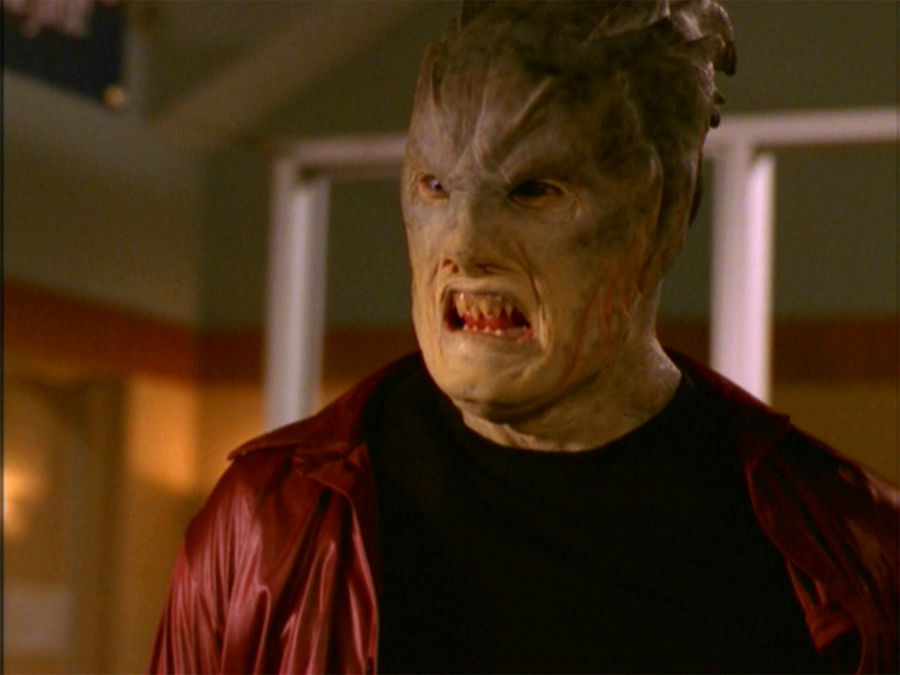
Ronan the Accuser is a terrible villain. Thanos is MCU’s Big Bad. Ronan is merely a henchman for Thanos who goes mildly rogue. Thanos can’t be bothered to stop Ronan’s rogue nature, for whatever reason, sitting in his chair doing nothing but sending daughters down to do his dirty work. This type of setup is perfect for an episode 9 of a late season Buffy, where that season’s Big Bad is concocting things to throw at Buffy, even though Buffy is just barely getting a sense of who the Big Bad is. But, the setup of fighting a minor villain is terrible for a standalone movie.
By the end of the movie, as per usual, the Guardians end up being victorious, defeating the mini-boss Ronan (though they also killed off a whole air fleet, and crashing a gigantic ship into a city in the process), and making sure the Infinity Element is in another pseudo-secure location from where people will be able to steal the ball at a later time. Star-Lord also reconciles his mommy issues. And…that’s about it.
Groot and Rocket don’t resolve any issues they have with their creator. Drox doesn’t satiate his vengeance for his family’s death. Gamora never solves her daddy issues. Star-Lord’s father is still unresolved (and even brought up as a good-bye cliffhanger plot point). The Infinity Element still exists and is in an unsecure place (albeit on a different planet). And, Thanos is still out there, Dr. Claw style, despite getting namechecked and shown throughout the movie.
Again, it’s a lot of set up for the upcoming episodes of Marvel Cinematic Universe, but it sucks for a standalone film.
The Glory of Geekdom
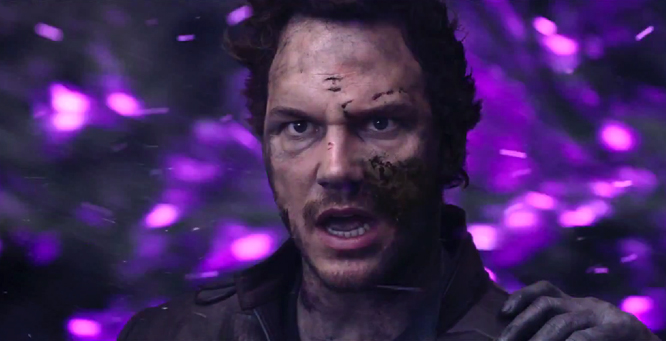 The moments where Guardians of the Galaxy shine are in creating moments that feel exactly like a comic book geek would create them. James Gunn was able to create many stand-out moments that felt like they belonged both in the movie and in a comic book. When Star-Lord rescues Gamora was a perfectly executed mini-sequence within a larger action sequence that captures the essence of the panel in a comic book.
The moments where Guardians of the Galaxy shine are in creating moments that feel exactly like a comic book geek would create them. James Gunn was able to create many stand-out moments that felt like they belonged both in the movie and in a comic book. When Star-Lord rescues Gamora was a perfectly executed mini-sequence within a larger action sequence that captures the essence of the panel in a comic book.
If I were to watch Guardians of the Galaxy as a 12-year-old knee deep in the MCU, this is exactly what I would want out of the movie. Lots of cool geeky moments that are wrapped around a plot that gives me a lot of information which will be important at a later date, and I can obsess over a bunch of the elements in order to make sure everything is going to tie in perfectly.
After half-assed attempts at avant-garding the comic book movie, like Ang Lee’s Hulk, James Gunn is able to get the avant garde pieces of a comic book and wrap them within the movie, creating a coherency without pandering. He truly gets why a comic book behaves the way it does, and how that works within a movie’s function. Not to mention, Gunn is not afraid of going for just the cool moments to make the audience go wow, but doesn’t cheapen them by making them fundamentally like fan service. They just feel like he was geeking out as much as he wanted the audience too.
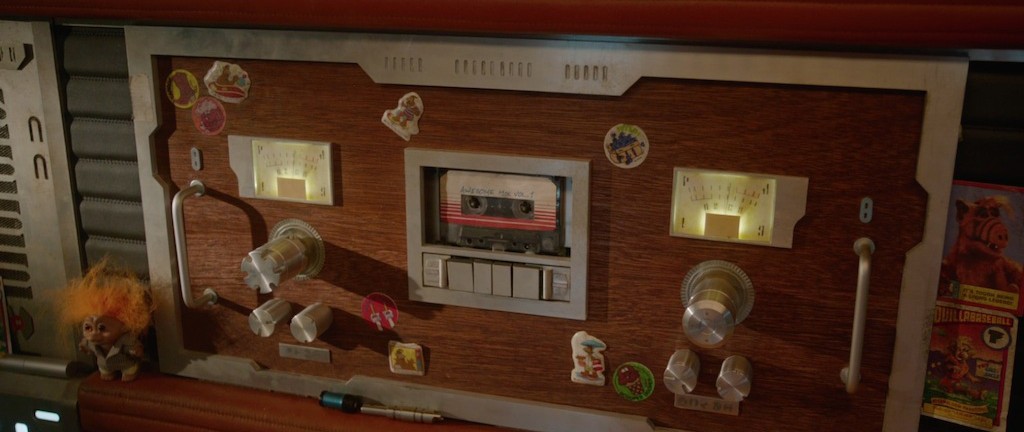 The Loss of Individuality
The Loss of Individuality
But, in geeking out, Gunn lost his essential James Gunn-ness. None of that was more obvious than through the soundtrack.
The soundtrack was an element of hype with “Oh, he pulled all these great songs out, and put them all together in a movie.” Much like a mix tape, this soundtrack was pulled from a whole bunch of other movies, stealing their thunder. I’m not talking about stealing from any half-assed movies either, as if Gunn is stealing from some low-budget indie movie that only 20 people have seen. He’s stealing from some major films.
Hooked on a Feeling being the most egregious, given that the Ooga Chakka intro is so iconic and identifiable, and that it was stolen from the founder of this style of soundtrack. Quentin Tarantino dusted off that single in 1992 for Reservoir Dogs, and blasted Ooga Chakka over the soundtrack as Mr. Orange goes on his first stake out.
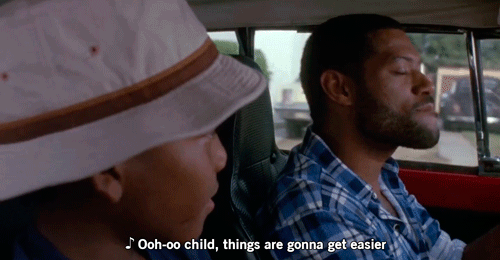
Other iconic songs from other movies included Dazed and Confused‘s Cherry Bomb, Boyz N The Hood‘s Ooh Child, and Almost Famous‘s Go All the Way. And, that’s not mentioning the overused Spirit in the Sky (from Michael, The Longest Yard, Apollo 13, and This is the End), Fooled Around and Fell in Love (from Boogie Nights, The Family Stone, Lovelace, and Harold and Kumar Escape from Guantanamo Bay among others), Escape (The Pina Colada Song), and Ain’t No Mountain High Enough.
In essence, James Gunn pulled together a soundtrack of some of the most overused songs from the 60s and 70s to make it into one big ball of “AGAIN?!” This wouldn’t be a big problem if Gunn used any of them iconically, but most of the moments in the movie felt like any “cool” song would have fit right in with them. If Gunn had used Kool and the Gang’s Open Sesame or Donna Summer’s I Feel Love instead of Hooked on a Feeling or Come and Get Your Love, would the scene have changed all that much? Very few of the songs that Gunn used had much impact on the tone of the scene, and fewer yet were meaningfully tied (either ironically or honestly) to their individual scenes.
The soundtrack of any movie needs to create specific moments with their songs, even if it’s just a black woman standing on a moving walkway while Across 110th Street, a theme song from another movie, blasts over the credits. Guardians, for me, failed to come close to any of the movie moments it tried to steal from.
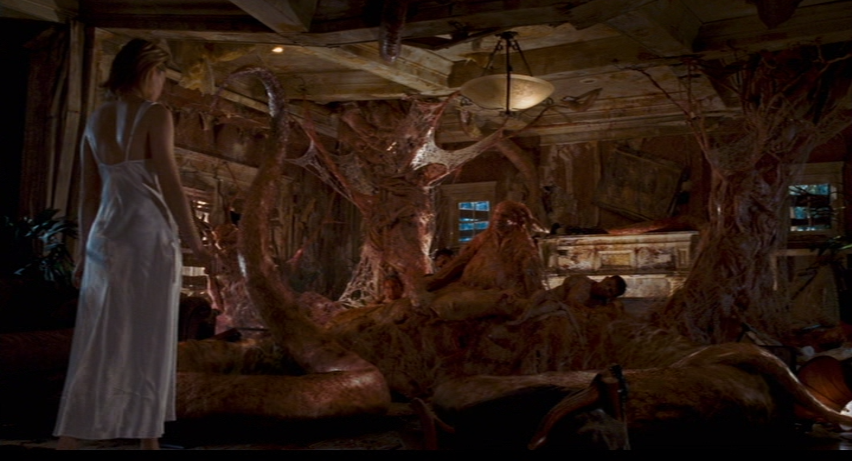
The Lack of Clever
What made James Gunn so great was his winking abuse of tropes almost to the point of subversion. Tromeo and Juliet, for instance, took the main characters and made them siblings due to affairs that tore the two families apart. Slither played with the levels of sexual overtones that horror movies have, both by plot and by effects. Even Scooby Doo was playing around with the elements of a Scooby-Doo episode before it resembled itself.
Little of that playfulness is present in Guardians of the Galaxy, seeming less like a James Gunn movie than ever before. Sure, everything’s kind of quirky and funny and cute, but little out of the ordinary happens. There are parental issues galore AND familial deaths galore. The element of self-sacrifice comes up without any irony.
The majority of the jokes and humor are played at the level of “Clever for Marvel” and not “Clever to James Gunn fans.” I found myself chuckling at a couple of moments with the dialogue, but for the most part, it all felt like a clever comic book geek, and not an artist who toys with the subversive.
Star Wars and politics
Guardians of the Galaxy was infinitely more clever when it was called Star Wars. In A New Hope, Luke’s father is never revealed. The Emporer isn’t even seen. And, unlike Ronan, Darth scurries away to fight another day (He’ll get you next time, Luke…next time!). Yet, both of the movies contain the plot elements of getting a ragtag bunch of heroes together, figuring out what is going on, and destroying the ship of their enemy.
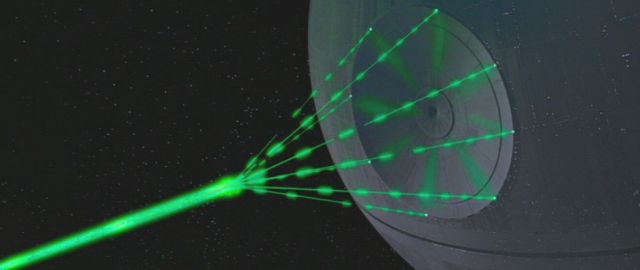
Even so, Ronan’s ship doesn’t feel nearly as weighted (plotwise) as the Death Star, in part because it doesn’t have the destruction capability of the Death Star. In Guardians, it’s the stone that’s the equivalent of the Death Star. So, to get the finality that I would have liked, the Infinity Element would have had to have been destroyed, not locked up in some place that Catherine Zeta Jones could get into in Entrapment. That would be like impounding the Death Star and waiting for Darth to climb over the fence to steal it.
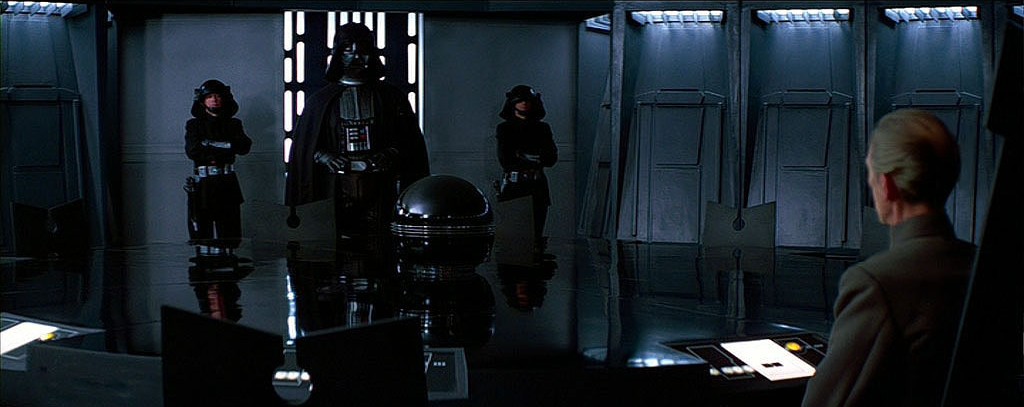
More importantly, what has changed between A New Hope and Guardians is politics. Kind of. A New Hope was founded in 1970s mistrust of the powers that be. 2014 is all about selling us the government. In 2014, instead of being anti-authoritarian, and aligning the audience with the rebellion against an empirical government who was pulling some tricks to take over a federation, Guardians merely wants us to revel in mild rebellion. Even to the point that the Guardians team up with a government against an individual pair of rebels (Ronan and Thanos).
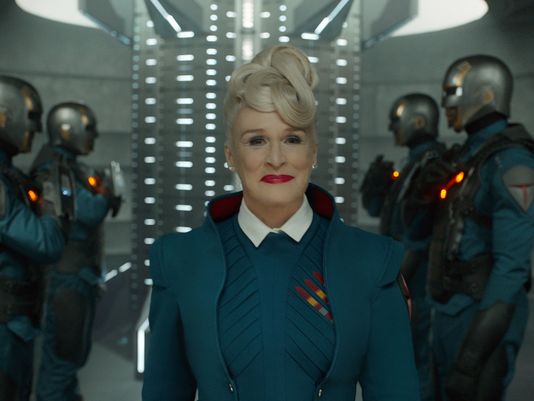
The message of Guardians is that you’re a rebel if you relate to rebels, even if you support the government. The government is good, and will ultimately reward you if you do good. Big Brother knows best. Etc. The Guardians aren’t really rebels in the true sense of a rebellion. They are out to stop a bad guy. Which isn’t really rebellious, all things considered. They’re just kind of morons. It reminds me of the messages that got trotted out with both this movie and The Imitation Game that both of these movies are about outsiders…who happened to work within the system to help the system (even if, in the latter case, the system ultimately does atrocious things to the person).
Similarly, James Gunn is currently posing himself as an outsider who worked outside the studio system and made this outsider movie with these outsider stars…that just happened to be a big budget movie from Marvel Studios. It’s a disturbing metanarrative that they’re creating which I really felt disgusted by. The co-option of the rebel is pandering to the geek outsider narrative, who have become the mainstream to our chagrin.
Conclusion
Which all sums up to, “If you go in to a Marvel movie expecting anything but a Marvel movie, you’re going to be in for a rough ride.” I went in expecting a rebellious piece of outsider art, and got a Marvel movie posing as outsider art. It was a good Marvel movie, for a Marvel movie. But, for a James Gunn movie, it was a huge fucking disappointment.

